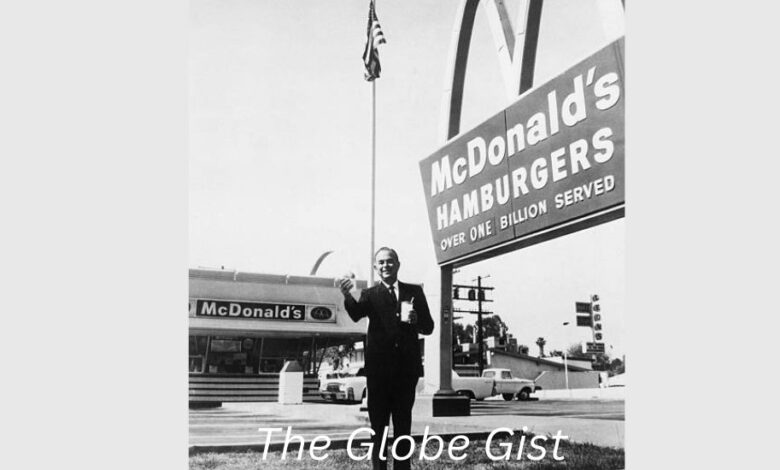Ray Kroc: The Visionary Who Transformed McDonald’s into a Global Empire

Raymond Albert “Ray” Kroc, born on October 5, 1902, in Oak Park, Illinois, is a name synonymous with the global fast-food revolution. Known as the man who turned McDonald’s into one of the largest and most successful fast-food chains in the world, Kroc’s story is one of persistence, vision, and strategic brilliance. His journey from a modest upbringing to building a multi-billion-dollar empire is a testament to the power of entrepreneurship and the impact of a visionary mindset.
Early Life and Influences
Ray Kroc grew up in a middle-class family in Oak Park, a suburb of Chicago. From a young age, he displayed remarkable determination and a strong work ethic. His father, a Czech immigrant, ran a paper-cutting business, which exposed Kroc early on to the values of hard work and discipline. Kroc’s childhood experiences, including his entrepreneurial spirit and drive to succeed, shaped the foundation for his later achievements.
Before entering the fast-food industry, Kroc spent over three decades as a traveling salesman. He sold a wide array of products, from paper cups to Multimixer milkshake machines. This period in his life was crucial, as it honed his salesmanship, persistence, and ability to spot business opportunities. Kroc often faced rejection, but his resilience allowed him to keep pushing forward, building the skills that would later define his legacy.
Discovery of McDonald’s
In 1954, while selling Multimixer milkshake machines, Kroc came across a small but highly efficient restaurant in San Bernardino, California, run by Richard and Maurice McDonald. The brothers had developed a unique system called the “Speedee Service System,” which emphasized fast service, consistent quality, and operational efficiency. Kroc was immediately intrigued by their innovative approach and saw the potential for nationwide expansion.
Recognizing the opportunity, Kroc approached the McDonald brothers with a proposal to franchise their concept. While the brothers were hesitant to scale beyond their original location, Kroc was determined. He believed that their system could revolutionize the food industry and was willing to take the risk to bring it to a national audience. This marked the beginning of Kroc’s journey to reshape the fast-food landscape.
The Franchising Revolution
Ray Kroc’s most significant contribution to McDonald’s was his aggressive and innovative franchising strategy. Unlike many other businesses at the time, Kroc insisted on strict operational standards and quality control across all franchise locations. He understood that consistency was key to building a recognizable and trusted brand. Franchisees had to adhere to detailed manuals, precise procedures, and specific layouts, ensuring that customers received the same experience no matter which McDonald’s they visited.
Kroc also emphasized strategic site selection, focusing on locations with high traffic and visibility. He encouraged franchisees to invest in modern, attractive buildings and standardized equipment. This approach not only improved operational efficiency but also reinforced the brand image, helping McDonald’s stand out in a competitive market. By the early 1960s, Kroc had successfully expanded McDonald’s into hundreds of outlets across the United States, establishing a blueprint for global franchising.
Acquisition of McDonald’s
In 1961, Ray Kroc took a decisive step that would define his career: he purchased the McDonald’s company from the original brothers for $2.7 million. This move gave him full control over the brand and the ability to implement his vision without constraints. Kroc’s acquisition marked the turning point where McDonald’s transitioned from a regional curiosity to a global powerhouse.
Under Kroc’s leadership, McDonald’s experienced unprecedented growth. By the late 1970s, the company had expanded to thousands of locations across the United States and internationally. Kroc introduced standardized menus, rigorous training programs for employees, and innovative marketing strategies that emphasized family-friendly dining experiences. The golden arches became an iconic symbol recognized around the world, and McDonald’s became synonymous with fast, affordable, and reliable food.
Business Philosophy and Management Style
Ray Kroc was not only a visionary but also a strict disciplinarian when it came to business. He believed that attention to detail, consistency, and relentless focus on operational excellence were the keys to success. Kroc’s management style was often described as demanding, but it produced results. He insisted that franchisees maintain high standards and closely monitored performance, ensuring that every McDonald’s upheld the brand’s reputation.
One of Kroc’s core philosophies was that the customer always comes first. He believed that providing a consistent and enjoyable experience was more important than short-term profits. This customer-centric approach, combined with his dedication to innovation and efficiency, set new standards in the fast-food industry. Kroc’s methods have since become case studies in business schools around the world, illustrating the importance of vision, discipline, and execution.
Ray Kroc’s Net Worth
At the height of his career, Ray Kroc accumulated significant wealth through his business ventures. By the early 1980s, his personal fortune was estimated at around $600 million, a substantial sum for the era. His wealth came not only from the sale of franchises but also from his ownership of the McDonald’s Corporation and associated investments. Kroc’s financial success reflected the scale and profitability of the empire he had built from a single innovative restaurant concept.
Kroc’s net worth also enabled him to pursue philanthropic efforts and invest in other ventures. He purchased the San Diego Padres baseball team in 1974 for $12 million, keeping the team in San Diego and actively supporting it until his death. His financial resources allowed him to leave a lasting legacy both in business and in charitable endeavors.
Personal Life and Legacy
Ray Kroc’s personal life was marked by both successes and challenges. He was married three times and had one daughter. Despite the demands of building a global business, Kroc valued family and often credited his drive to create a better life for his loved ones. He passed away on January 14, 1984, at the age of 81, leaving behind a vast empire and an enduring influence on the fast-food industry.
Beyond his business achievements, Kroc’s philanthropic efforts left a lasting impact. The Kroc Foundation supports medical research and education, while the Ronald McDonald House provides housing and assistance to families with hospitalized children. These initiatives reflect Kroc’s belief in giving back to the community and using his success to make a positive difference in the world.
Lessons from Ray Kroc’s Life
Ray Kroc’s life offers numerous lessons for entrepreneurs, business leaders, and anyone striving for success. His journey illustrates the importance of recognizing opportunity, taking calculated risks, and persisting in the face of rejection. Kroc demonstrated that vision alone is not enough—execution, discipline, and attention to detail are critical to turning ideas into reality.
Kroc also exemplifies the power of franchising as a model for scaling businesses. By creating standardized processes, maintaining quality control, and empowering franchisees, he was able to expand McDonald’s rapidly and sustainably. His methods continue to influence the food industry, retail, and countless other sectors that rely on consistent brand experiences.
Ray Kroc’s Enduring Impact
Today, McDonald’s operates in over 100 countries, serving millions of customers daily. The golden arches are instantly recognizable, and the brand’s principles of consistency, efficiency, and customer focus continue to guide its operations. Ray Kroc’s story is a testament to the transformative power of entrepreneurship and the enduring impact of visionary leadership.
Kroc’s legacy extends beyond business. His philanthropic work, commitment to community, and contributions to the growth of American culture through fast food have cemented his place in history. As a self-made entrepreneur who turned a small regional restaurant into a global empire, Ray Kroc remains an inspiration to aspiring business leaders around the world.
Conclusion
Ray Kroc’s journey from a traveling salesman to the architect of the McDonald’s empire is a remarkable story of ambition, innovation, and perseverance. His ability to recognize potential, implement disciplined strategies, and scale a small business into a global brand set new benchmarks in the fast-food industry. Beyond his financial success, Kroc’s philanthropic efforts and lasting impact on communities worldwide highlight the enduring nature of his contributions. Today, the story of Ray Kroc continues to inspire entrepreneurs and business leaders, showing that vision combined with relentless execution can create a legacy that transcends generations.
For more insights into the lives of influential figures like Ray Kroc, visit The Globe Gist for detailed profiles, business stories, and inspiring entrepreneurial journeys.
Ray Kroc’s influence stretched far beyond his business empire; he also left behind a family legacy. At the heart of that legacy was his only daughter, whose life story deserves equal recognition. Explore the journey of Marilyn Janet Kroc Barg, the woman who carried forward the Kroc name in her own way.



